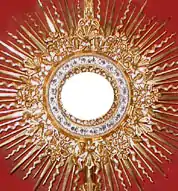Holy Hour
Holy Hour (Latin: sanctus hora) is the Roman Catholic devotional tradition of spending an hour in Eucharistic adoration in the presence of the Blessed Sacrament.[1] A plenary indulgence is granted for this practice.[2] The practice is also observed in some Anglican churches.
| Part of a series on |
| Eucharistic adoration of the Catholic Church |
|---|
 |
| Papal documents |
| Organisations and events |
| Notable individuals |
| Eucharistic meditators |
|
|
Description
In 1673 Saint Margaret Mary Alacoque stated that she had a vision of Jesus in which she was instructed to spend an hour every Thursday night to meditate on the sufferings of Jesus in the Garden of Gethsemane. This practice later became widespread among Roman Catholics.[3][4][5]
The inspiration for the Holy Hour is Matthew 26:40.[6] In the Gospel of Matthew, during the agony in the Garden of Gethsemane the night before his crucifixion, Jesus spoke to his disciples, saying "My soul is sorrowful even to death. Remain here and keep watch with me." (Matthew 26:38) Returning to the disciples after prayer, he found them asleep and in Matthew 26:40 he asked Peter:
- "So, could you men not keep watch with me for an hour?".[6]
In 1829, the Archconfraternity of the Holy Hour was established by Père Robert Debrosse at Paray-le-Monial, Burgundy, France.[7] In 1911 it received the right of aggregation for the entire world.[8] A similar society called "The Holy Perpetual Hour of Gethsemani" was formed in Toulouse in 1885 and was canonically erected in 1907. In 1909 it received indulgences from Pope Pius X.[9][10]
The practice of a "daily Holy Hour" has been encouraged in the Catholic tradition, for instance Mother Teresa of Calcutta had a Holy Hour each day and all members of her Missionaries of Charity followed her example.[11][12] The Holy Hour has been practiced by saints such as Gemma Galgani and Faustina Kowalska.[13]
Slang meaning
In the Irish Free State and Republic of Ireland, the "holy hour" (Irish: uair bheannaithe) was the term applied to the closing of public houses between 2.30 and 3.30 p.m. on Monday to Saturday in the cities of Dublin and Cork.[14][15][16] It was introduced by Minister for Justice Kevin O'Higgins in the 1920s to curb afternoon drinking by workers.[17] It was removed in 1988.[18][19] On Sundays, pubs in Cork and Dublin had to close between 2 and 4 p.m.; this restriction was not removed until 2000.[20][21] Pubs often merely locked the doors, allowing those in the pubs to continue drinking during the holy hour.[22][23][24][25][26]
References
- "The New Catholic Dictionary". Archived from the original on 2009-09-29. Cite journal requires
|journal=(help) - Apostolic Penitentiary. Manual of Indulgences: Norms and Grants. 2006. Washington, D.C.: United States Conference of Catholic Bishops. p. 48.
- Ann Ball, 2003 Encyclopedia of Catholic Devotions and Practices ISBN 0-87973-910-X page 240
- The Westminster Dictionary of Christian Spirituality by Gordon S. Wakefield 1983 ISBN 0-664-22170-X page 347
- Doll, Sister Mary Bernard. "St. Margaret Mary Alacoque." The Catholic Encyclopedia Vol. 9. New York: Robert Appleton Company, 1910. 19 December 2019
 This article incorporates text from this source, which is in the public domain.
This article incorporates text from this source, which is in the public domain. - Peter Stravinskas, 1998, Our Sunday Visitor's Catholic Encyclopedia, OSV Press ISBN 0-87973-669-0 page 498
- "CATHOLIC ENCYCLOPEDIA: Paray-Le-Monial". www.newadvent.org.
- Acta Apostolicae Sedis, III, 157.
- Acta Apostolicae Sedis, I, 483.
- "CATHOLIC ENCYCLOPEDIA: Sodality". www.newadvent.org.
- A Drama of Reform by Benedict J. Groeschel 2005 ISBN 1-58617-114-3 page 30
- My Daily Eucharist II Joan Carter McHugh 1997 ISBN 0-9640417-5-8 page 14
- The voices of Gemma Galgani by Rudolph M. Bell, 2003 ISBN 0-226-04196-4 pages 15 and 47
- Kelleher, Terry (June 30, 1972). "The essential Dublin". Gill and Macmillan – via Google Books.
- Ionnrachtaigh, Seosamh Mac (June 2, 2015). Impreasin na Gaeilge I – Z: (Fuaim na Gaeilge). AuthorHouse. ISBN 9781496984203 – via Google Books.
- "Over 55, Hotel Offers, Discounts, Senior Specials and Offers, Midweek Breaks, Weekend Breaks, Golden Hotel Breaks, Senior". www.goldenireland.ie.
- "Calling Time On Holy Hour". RTÉ Archives.
- "Díosbóireachtaí Párlaiminte: Tuairisc Oifigiúil". Cahill & Company, Limited. June 30, 1988 – via Google Books.
- Healy, Mel (March 25, 2016). "Good Friday, the holy hour and the bona fides".
- Dunne, Declan (May 8, 2015). Mulligan's: Grand Old Pub of Poolbeg Street. Mercier Press Ltd. ISBN 9781781173497 – via Google Books.
- Donohoe, Miriam. "Longer pub opening hours come into operation today". The Irish Times.
- "A pub in Galway is bringing back the (in)famous 'Holy Hour lock-in' this coming Easter Sunday". JOE.ie.
- "Calling time on the holy hour". independent.
- "Irish pubs for dummies- a lesson in decorum". IrishCentral.com. June 2, 2011.
- Dolan, T. P. (June 30, 2004). A Dictionary of Hiberno-English: The Irish Use of English. Gill & Macmillan Ltd. ISBN 9780717135356 – via Google Books.
- Kearns, Kevin C. (August 1, 1996). Dublin Pub Life and Lore – An Oral History of Dublin's Traditional Irish Pubs: The Recollections of Dublin's Publicans, Barmen and 'Regulars'. Gill & Macmillan Ltd. ISBN 9780717164714 – via Google Books.
